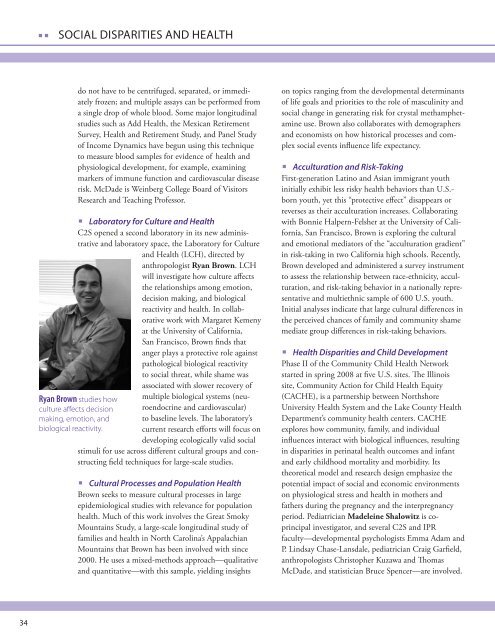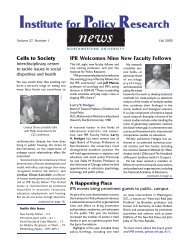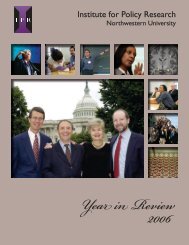IPR - Institute for Policy Research - Northwestern University
IPR - Institute for Policy Research - Northwestern University
IPR - Institute for Policy Research - Northwestern University
Create successful ePaper yourself
Turn your PDF publications into a flip-book with our unique Google optimized e-Paper software.
Social Disparities and Health<br />
do not have to be centrifuged, separated, or immediately<br />
frozen; and multiple assays can be per<strong>for</strong>med from<br />
a single drop of whole blood. Some major longitudinal<br />
studies such as Add Health, the Mexican Retirement<br />
Survey, Health and Retirement Study, and Panel Study<br />
of Income Dynamics have begun using this technique<br />
to measure blood samples <strong>for</strong> evidence of health and<br />
physiological development, <strong>for</strong> example, examining<br />
markers of immune function and cardiovascular disease<br />
risk. McDade is Weinberg College Board of Visitors<br />
<strong>Research</strong> and Teaching Professor.<br />
< Laboratory <strong>for</strong> Culture and Health<br />
C2S opened a second laboratory in its new administrative<br />
and laboratory space, the Laboratory <strong>for</strong> Culture<br />
and Health (LCH), directed by<br />
anthropologist Ryan Brown. LCH<br />
will investigate how culture affects<br />
the relationships among emotion,<br />
decision making, and biological<br />
reactivity and health. In collaborative<br />
work with Margaret Kemeny<br />
at the <strong>University</strong> of Cali<strong>for</strong>nia,<br />
San Francisco, Brown finds that<br />
anger plays a protective role against<br />
pathological biological reactivity<br />
to social threat, while shame was<br />
associated with slower recovery of<br />
Ryan Brown studies how multiple biological systems (neuroendocrine<br />
and cardiovascular)<br />
culture affects decision<br />
making, emotion, and to baseline levels. The laboratory’s<br />
biological reactivity. current research ef<strong>for</strong>ts will focus on<br />
developing ecologically valid social<br />
stimuli <strong>for</strong> use across different cultural groups and constructing<br />
field techniques <strong>for</strong> large-scale studies.<br />
< Cultural Processes and Population Health<br />
Brown seeks to measure cultural processes in large<br />
epidemiological studies with relevance <strong>for</strong> population<br />
health. Much of this work involves the Great Smoky<br />
Mountains Study, a large-scale longitudinal study of<br />
families and health in North Carolina’s Appalachian<br />
Mountains that Brown has been involved with since<br />
2000. He uses a mixed-methods approach—qualitative<br />
and quantitative—with this sample, yielding insights<br />
on topics ranging from the developmental determinants<br />
of life goals and priorities to the role of masculinity and<br />
social change in generating risk <strong>for</strong> crystal methamphetamine<br />
use. Brown also collaborates with demographers<br />
and economists on how historical processes and complex<br />
social events influence life expectancy.<br />
< Acculturation and Risk-Taking<br />
First-generation Latino and Asian immigrant youth<br />
initially exhibit less risky health behaviors than U.S.-<br />
born youth, yet this “protective effect” disappears or<br />
reverses as their acculturation increases. Collaborating<br />
with Bonnie Halpern-Felsher at the <strong>University</strong> of Cali<strong>for</strong>nia,<br />
San Francisco, Brown is exploring the cultural<br />
and emotional mediators of the “acculturation gradient”<br />
in risk-taking in two Cali<strong>for</strong>nia high schools. Recently,<br />
Brown developed and administered a survey instrument<br />
to assess the relationship between race-ethnicity, acculturation,<br />
and risk-taking behavior in a nationally representative<br />
and multiethnic sample of 600 U.S. youth.<br />
Initial analyses indicate that large cultural differences in<br />
the perceived chances of family and community shame<br />
mediate group differences in risk-taking behaviors.<br />
< Health Disparities and Child Development<br />
Phase II of the Community Child Health Network<br />
started in spring 2008 at five U.S. sites. The Illinois<br />
site, Community Action <strong>for</strong> Child Health Equity<br />
(CACHE), is a partnership between Northshore<br />
<strong>University</strong> Health System and the Lake County Health<br />
Department’s community health centers. CACHE<br />
explores how community, family, and individual<br />
influences interact with biological influences, resulting<br />
in disparities in perinatal health outcomes and infant<br />
and early childhood mortality and morbidity. Its<br />
theoretical model and research design emphasize the<br />
potential impact of social and economic environments<br />
on physiological stress and health in mothers and<br />
fathers during the pregnancy and the interpregnancy<br />
period. Pediatrician Madeleine Shalowitz is coprincipal<br />
investigator, and several C2S and <strong>IPR</strong><br />
faculty—developmental psychologists Emma Adam and<br />
P. Lindsay Chase-Lansdale, pediatrician Craig Garfield,<br />
anthropologists Christopher Kuzawa and Thomas<br />
McDade, and statistician Bruce Spencer—are involved.<br />
34
















